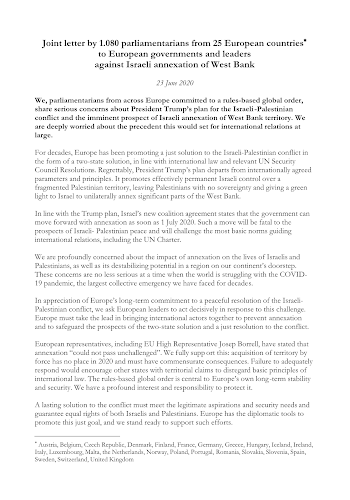While the following question and answer session with U.S. Secretary of State Mike Pompeo on June 24, 2020 appears to greenlight Israel's unilateral annexation of at least part of the West Bank as quoted here:
"QUESTION: Hi. Israel may be annexing parts of the West Bank and Jordan Valley in a week, and Jordan has said annexation could kill its peace treaty with Israel. UAE’s Ambassador to the U.S. Otaiba said it would end any hopes of normalizing relations with the Gulf and Arab states. So my question is: How concerned are you about potential ramifications of annexation? And do you favor an incremental approach or an immediate annexation of 30 percent, as proposed in the White House peace plan?
POMPEO: Your first question was about Israel. We unveiled a Middle East peace vision some number of months ago now, and we’re continuing to work down that path. Decisions about Israeli and extending sovereignty in other places are decisions for the Israelis to make, and we are talking to all of the countries in the region about how it is we can manage this process for our end state objective. It’s, I think, the objective that the prime minister has certainly acknowledged he wants, right. He wants our Middle East peace vision to be successful. The Gulf states have all indicated that they are hopeful that we can put that in place. I regret only that the Palestinian Authority has refused to participate in that, right. They simply have rejected this out of hand. We simply asked that they come to the negotiating table based on what’s outlined in the Vision for Peace, and they have chosen not to. They have chosen to threaten, to bluster, to assert that they’re going to deny the ability to do security – that’s not good for the Palestinian people. It’s dangerous for the people that live in those places too.
What we’ve asked is for them to come together, for Israel and the Palestinian people to come to the table to negotiate a path forward and to find a resolution to this decades-long challenge. I remain hopeful that in the coming weeks we can begin to make real progress towards achieving that."
Thanks to the Washington Institute, we have maps showing several options for annexing the West Bank. Let's look at two of them:
1.) Full annexation of all 130 settlements with 78 Palestinian communities (these enclaves would lie within the future Palestinian state but be under full Israeli control. This would result in annexation of 29 percent of the total area of the current West Bank:
2.) All 52 Israeli bloc settlements within the barrier. This would result in the annexation of 7 percent of the total area of the current West Bank:
While Mike Pompeo seems to be turning a blind eye towards Israel's annexation of the West Bank or any part thereof, there has been backlash from some key groups including a significant number of influential Jewish leaders:
1.) European Parliamentarians - 1080 European parliamentarians have signed a letter strongly opposing Israel's plan to unilaterally annex parts of the West Bank, warning that the move could be "fatal to the prospects of peace" as shown here:
2.) Israeli Policy Forum - Over 130 American Jewish leaders have sent the following to Israel's Alternate Prime Minister and Minister of Defense Benny Gantz and Israel's Minister of Foreign Affairs Gabi Ashkenazi :
3.) Commanders for Israel's Security - Israeli media outlet Haaretz featured a full-page advertisement by the Commanders for Israel's Security outlining their negative position on annexation. In total, 200 Israeli generals and their equivalents signed this petition:
4.) Members of the United States Congress -
In case you were curious, here is the text of House Resolution 326 which supports the two-state solution:
Israel's plan to annex any portion of the West Bank (beyond the territory already occupied by the significant number of Israeli settlements) would likely be seen as a move that will undermine the pillars of Washington's strategy in the region. Given the West Bank's geographic proximity to Jordan, annexation could destabilize Jordan's America-friendly monarchy and it could impact Israel's growing relationship with Saudi Arabia, a nation that provides Israel with a territorial buffer from its archenemy, Iran. Annexation may also prove to be very unpopular with everyday Israelis as shown in this article from Haaretz:













No comments:
Post a Comment